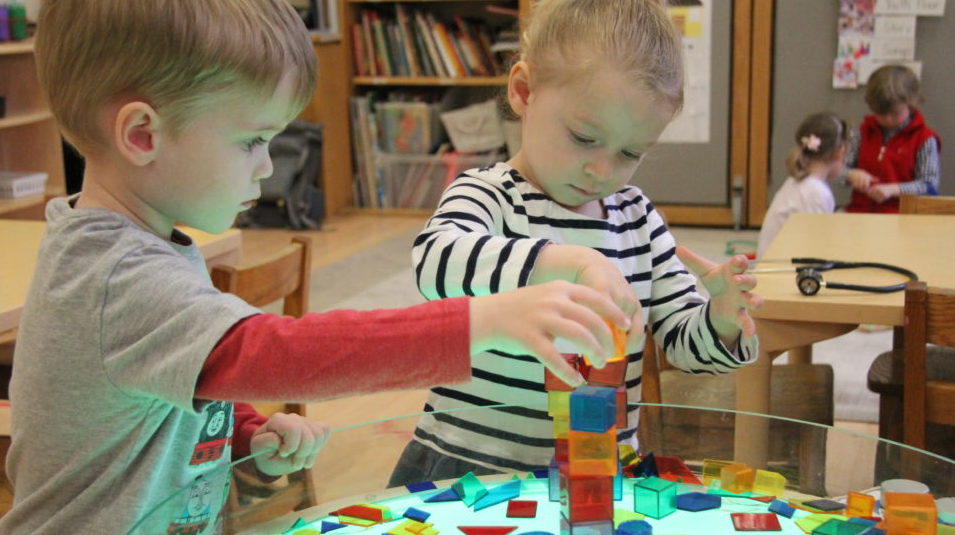We believe in play as the work of young children, and the importance of striking a balance between skill building and project work while being mindful of children’s different learning styles. We also believe in the need for balance between teacher direction and children’s choice. Every aspect of our educational program is designed to attain these balances and provide children with play-based learning opportunities to further their learning and help them reach their highest potential.
Assessment contributes significantly to the analysis and modification of our educational program. We assess children’s interests before embarking on a project and, as the project gets underway, to guide our choices of activities and materials. Teachers discuss successful projects to help decide whether to undertake the same exploration the following year, whether to bring other classes into the exploration, and whether to expand the project into music and movement class or the art studio. Assessment of students during skill building activities such as working with Stern blocks or Handwriting Without Tears includes not only an assessment of the actual skill in question, but also confidence level, interest, taking charge of own learning, creating meaning and trying their own strategies rather than just receiving information. This approach to assessment supports Brick’s mission and our commitment to the whole child and supporting and promoting development in all areas.
Skills and knowledge are assessed through games, discussion, art, drama, listening in on conversations and recording children’s words, etc. The goal is to assess in a natural way, but also to give children practice in speaking up and explaining their ideas. Children are encouraged to add more detail to art, elaborate on verbal descriptions, and more, so that they develop the tools they need to really show what they know and think deeply about their ideas. They are encouraged to reflect on their own work, for example, to select and talk about their favorite page from a book they have made. The Reggio Emilia approach requires teachers to focus not on what they are teaching, but on what children are learning, and that distinction is significant for how we approach assessment at Brick.
The major priorities of our educational program include meeting the needs of our individual students; allowing teachers to teach from their areas of strength and interests while maintaining a cohesive philosophy and program across all classes; and continuing to implement ideas from the Reggio Emilia approach in ways that are appropriate to our culture as an American, not Italian, school and also in light of the unique circumstances to be found in a New York City early childhood school. We feel fortunate to have the perspective that limitations in the ways in which Reggio Emilia can be incorporated into our program lead us to generate new ideas and creatively take the positives from both Reggio and Brick as it has traditionally been.
The educational offerings of the School reflect our commitment to providing each student with meaningful, age-appropriate learning experiences. The curriculum integrates the areas of math, language arts, science, social studies, cooking, art, music and movement, storytelling, values and ethics, and physical development, and increasingly adopts the project approach of the Reggio Emilia schools to do so. Social and emotional development is given equal importance to physical and cognitive development at Brick. Meaningful interaction with others depends upon a secure sense of self; therefore, we strive to enhance children’s self-confidence through acknowledgement of their efforts in all curriculum areas and building their independence, so that they feel empowered and responsible for their own learning. Across all areas of the curriculum, children have opportunities for social and emotional growth, as they develop friendships, learn to handle frustration and resolve conflicts appropriately. They learn to problem solve, to function as part of a group, to follow routines and engage in cooperative activities. Children become confident in their abilities, grow in independence and self-confidence, and see themselves as a contributing community member.
Cognitive development is also supported in all areas of our curriculum. By engaging our students, supporting them as they explore topics of interest, introducing skills in context, providing them with learning experiences that use concrete materials, developing their reasoning and logical thinking skills, helping them to analyze, question, categorize, compare, contrast, predict, estimate, etc., we support their cognitive development in all of our educational offerings.
Review of all areas of the curriculum is undertaken by the faculty and administration on a regular basis. Student progress is one indicator of the effectiveness of aspects of a curriculum area. If a teacher notices that students are not progressing as expected, that will result in an examination of the curriculum areas, with questions posed about the appropriateness of the expectation and adjustments are made. Therefore, the curriculum is always evolving and changing based on the children’s needs.
